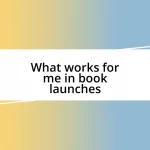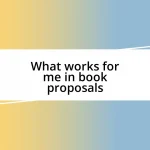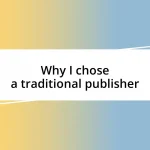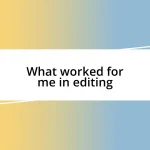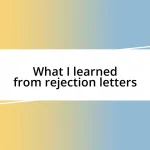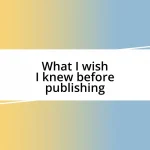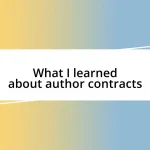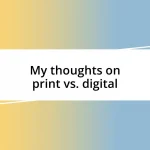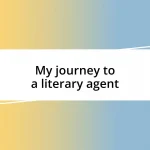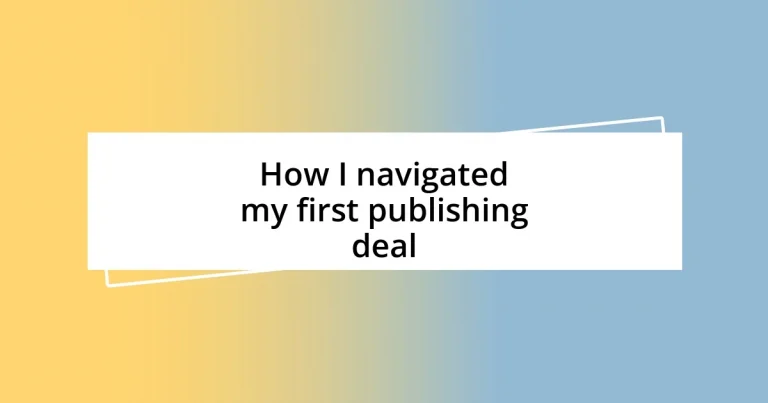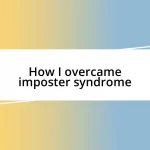Key takeaways:
- Understanding the publishing industry involves exploring traditional publishing, self-publishing, and the impact of digital formats on authors’ choices.
- Choosing the right publisher is crucial; aligning values with publishers and understanding the pros and cons of different types—traditional, small, and self-publishing—benefits authors greatly.
- Learning from feedback and reviews is essential for growth; distinguishing between types of feedback helps improve writing while connecting deeply with readers enhances the sense of purpose as a writer.
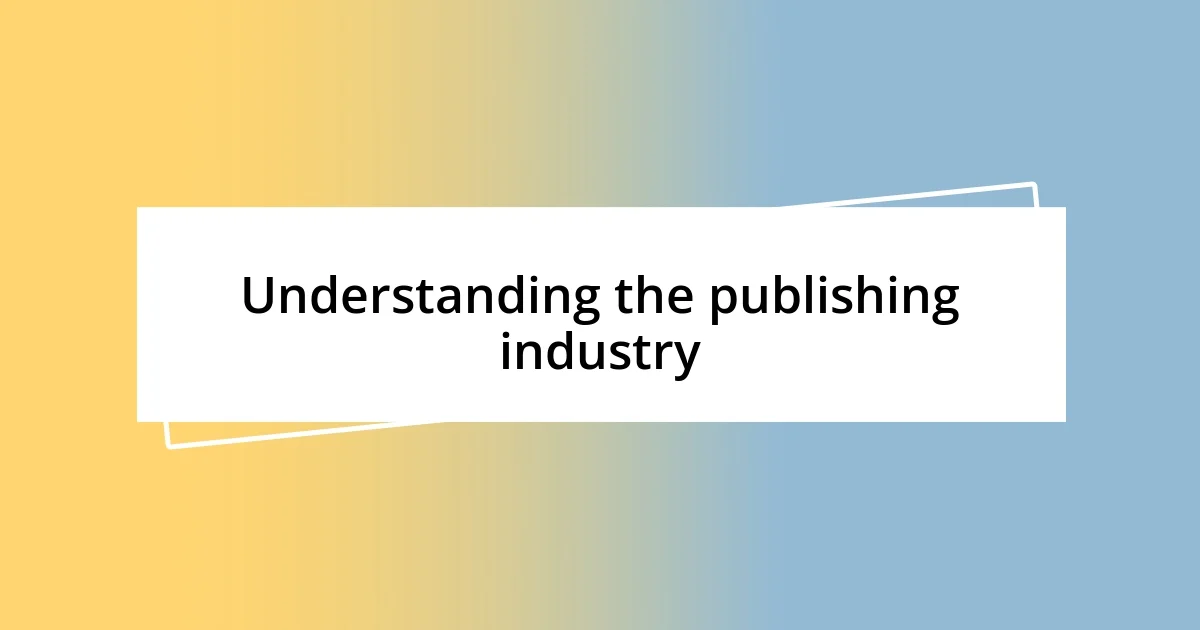
Understanding the publishing industry
The publishing industry can seem like a labyrinth to newcomers. I remember feeling overwhelmed when I first tried to understand the various roles—agents, editors, and publishers. Each player has a distinct influence on your book’s journey, and navigating their expectations can feel daunting. Have you ever found yourself stuck in a conversation where you didn’t quite grasp the terms being thrown around? That’s how I felt reading industry jargon for the first time.
During my research, I learned that traditional publishing is just one route. There’s also self-publishing, which I initially thought was a lesser option, yet it opened my eyes to creative freedom. My heart raced as I weighed the pros and cons—would I sacrifice the credibility of a traditional publisher for the autonomy of self-publishing? The indecisiveness was real.
A crucial point to consider is the changing landscape of digital publishing. I watched as many friends transitioned from print to e-books, and it made me question my own preferences. How many times have you seen an author you love thrive in digital formats and wondered if that could be you? The excitement and anxiety wrapped together in that possibility drove me to explore all avenues available, helping me to form a clearer vision of my own path.
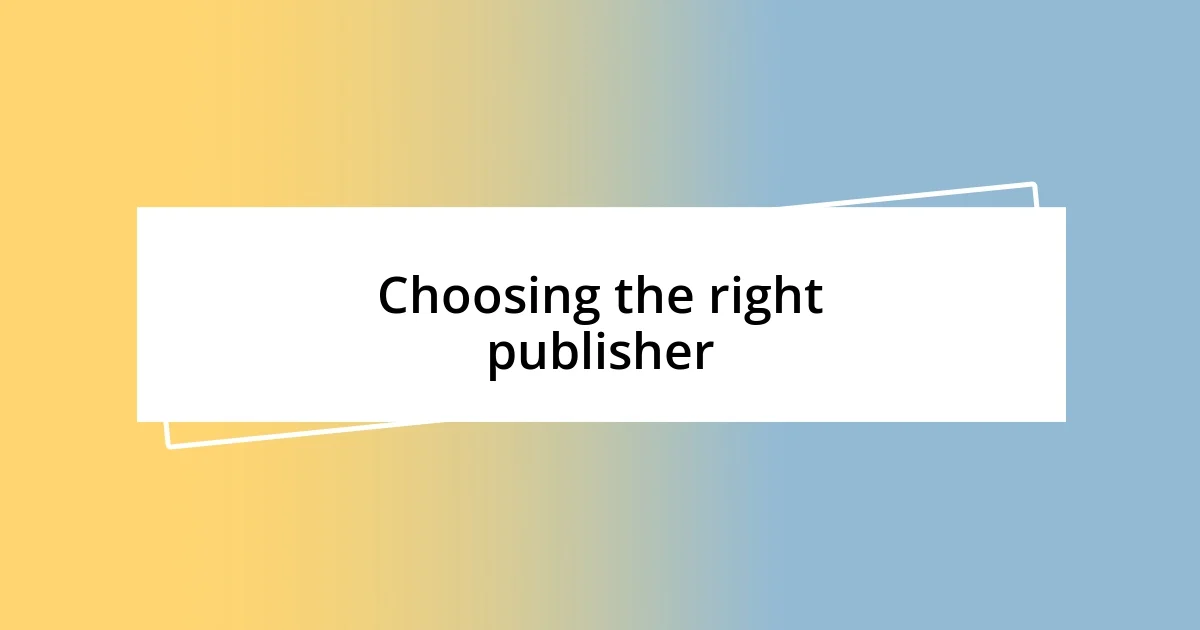
Choosing the right publisher
Choosing the right publisher felt like dating for the first time—exciting yet nerve-wracking. I distinctly remember sifting through various websites, scrolling endlessly, and making lists of potential publishers. One highlighted the importance of their author support programs, while another boasted impressive distribution networks. I had to ask myself: what would matter most to me as a fledgling author? That thought made my stomach flutter.
One lesson I learned was to prioritize my values. I found publishers who shared the same vision as mine. I recall a moment of clarity when I found a small publisher that championed diverse voices. It felt like I was not just another number; they truly saw me and my story. Have you ever found that special connection that just clicks? That’s what happened for me, and it made all the difference.
Ultimately, I had to weigh the benefits of established publishers against the warmth of smaller presses. The comparison process was enlightening, but it was also a little intimidating. Here’s a quick table that helped me visualize the differences:
| Publishing Type | Pros | Cons |
|---|---|---|
| Traditional Publisher | Established credibility and distribution | Less creative control and potentially slow process |
| Small Publisher | Personalized support and niche focus | Limited market reach and resources |
| Self-Publishing | Full creative control and potential for higher earnings | Requires self-promotion and upfront costs |
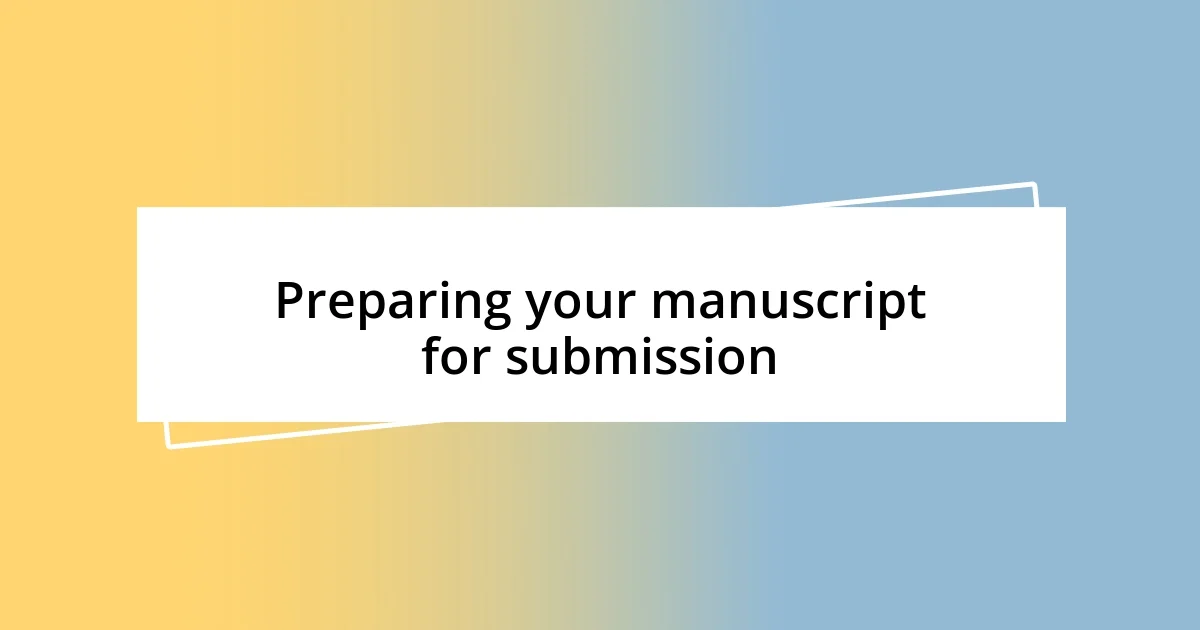
Preparing your manuscript for submission
Preparing your manuscript for submission is a critical step in the publishing journey. I’ll tell you this: revising my manuscript felt like looking in a funhouse mirror—each edit revealed something new. I had to take a step back and view the document not just as my labor of love, but as a product ready for scrutiny. I’ll never forget the relief I felt when I finally had it professionally edited—it was like having a fresh pair of eyes shining a light on my best work.
Here’s a checklist that guided my preparation process:
- Proofread meticulously: Typos or grammatical errors can distract or frustrate an editor. I often found it helpful to read my manuscript out loud.
- Formatting matters: Following submission guidelines—like font size, margins, and page numbering—can set the tone for professionalism. I learned quickly that these details do count!
- Include a synopsis: Summarizing my book in a single page made me crystallize my story’s core message. I remember wrestling with it, but the process clarified my vision.
- Craft a compelling query letter: I spent hours on this, as it’s your first impression. I made sure to personalize each letter to the specific publisher or agent.
- Prepare a bio: I made it short but impactful, highlighting what makes me—my experience and connection to the story—unique.
As I double-checked each element, I felt a mix of nerves and anticipation. It was the culmination of countless hours of writing, rewriting, and dreaming. What a moment it was, knowing my manuscript was finally ready to embark on its own journey!
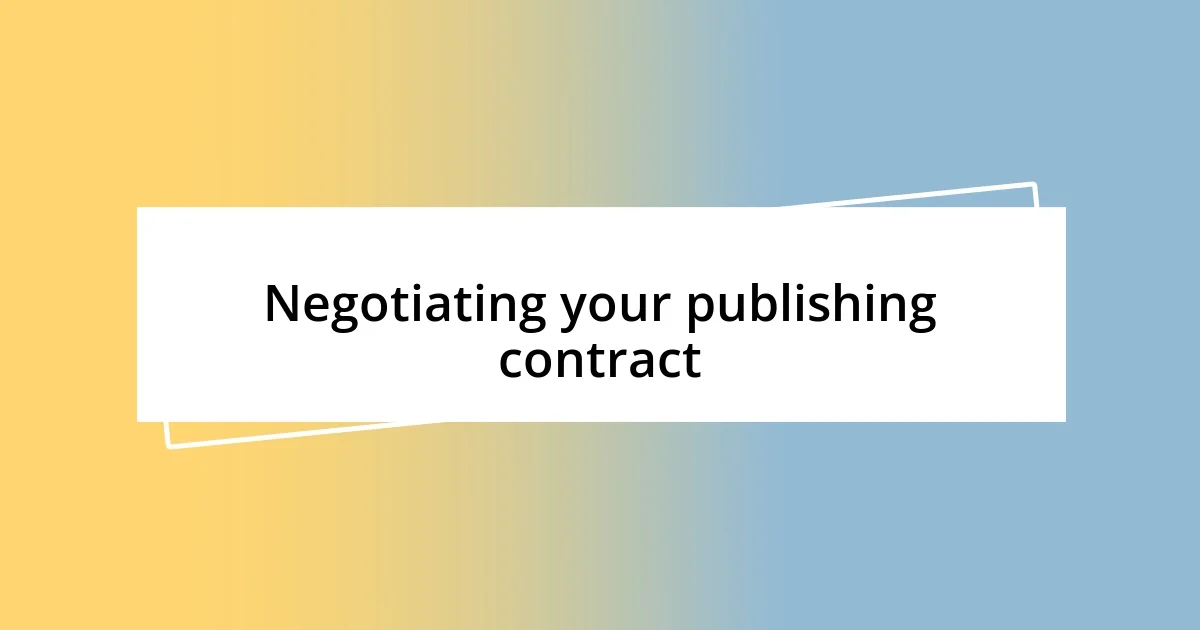
Negotiating your publishing contract
Negotiating your publishing contract can feel daunting, even a bit overwhelming. I remember sitting at my kitchen table, a mass of papers and legal jargon sprawled before me. It was essential to take a deep breath, remind myself that this was a significant step forward, and then dive in. How could I secure my rights while ensuring the best possible support for my book? I recalled my gut feeling when selecting a publisher; I needed to trust that same instinct during negotiations.
One of the key takeaways from my experience was the importance of clarity. I fought hard to ensure that the terms surrounding royalties were plainly laid out. Initially, I felt shy voicing my thoughts, but then I remembered: this was my work, my passion! I questioned everything: “How often would I receive royalty statements? What percentage would I earn?” Each answer added a layer of reassurance, yet it also empowered me to negotiate further.
I also learned that timing is critical when it comes to negotiations. I once received an offer that seemed tantalizing, but I had to pause and reflect. Was it the right deal for me? Pushing to discuss and possibly delay the signing allowed me to gain perspective and even discover additional perks. That moment taught me that advocating for myself would be vital, not just in negotiations, but throughout my entire publishing journey. How about you? Have you ever faced a similar decision that required careful deliberation? It can be both challenging and rewarding to navigate those waters!
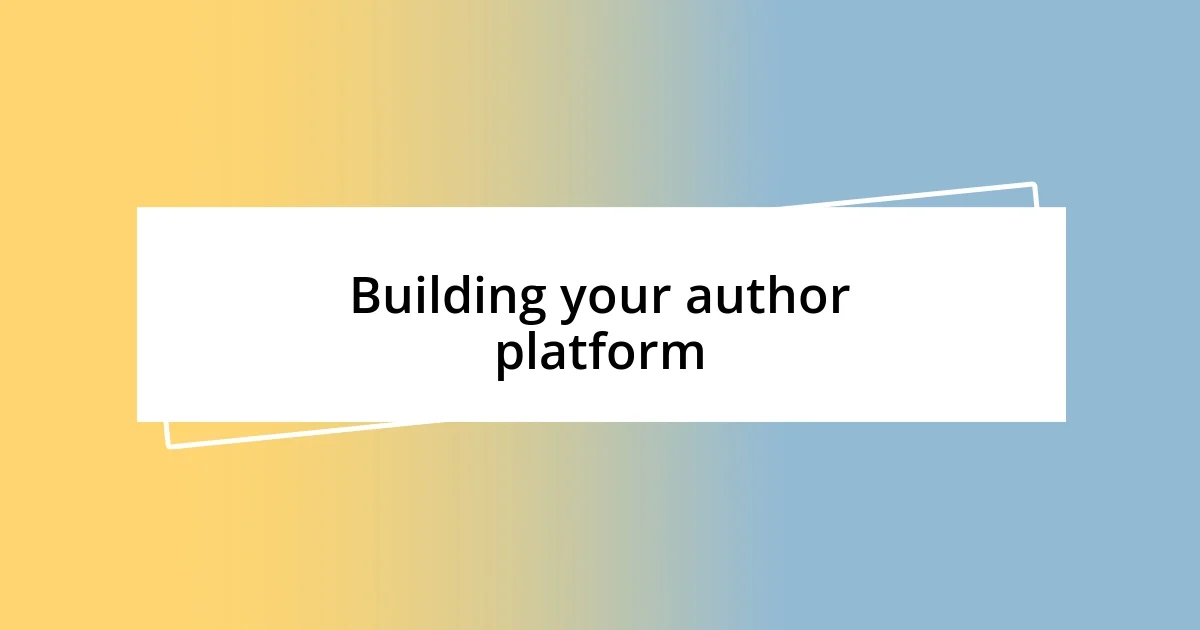
Building your author platform
Building an author platform is like planting seeds in a garden; it takes time and nurturing to see growth. I’ll never forget my excitement when I set up my first social media accounts dedicated to my writing. At first, it felt a bit awkward, like talking to an empty room. But slowly, as I shared snippets of my journey and interacted with fellow writers and readers, I began to form connections that transformed my platform into a vibrant community.
One of the most enlightening moments for me was when I hosted a virtual book club. The response was overwhelming; readers shared their thoughts, asked questions, and created a lively discussion. I realized that fostering engagement is key. It’s not just about broadcasting my work; it’s about listening to my audience and building relationships. Have you ever participated in a discussion that sparked new ideas? For me, those exchanges were often where the best inspirations came from.
I also found that consistency was crucial. Maintaining a regular posting schedule not only kept my audience engaged but also showed my dedication to my craft. Whether it was sharing behind-the-scenes glimpses of my writing process or featuring fellow authors, each post was another brick in the foundation of my platform. What strategies have you considered to stay consistent? I encourage you to reflect on what truly connects you with your audience. Your authentic voice can significantly enhance your author platform, creating a lasting impression within the literary community.
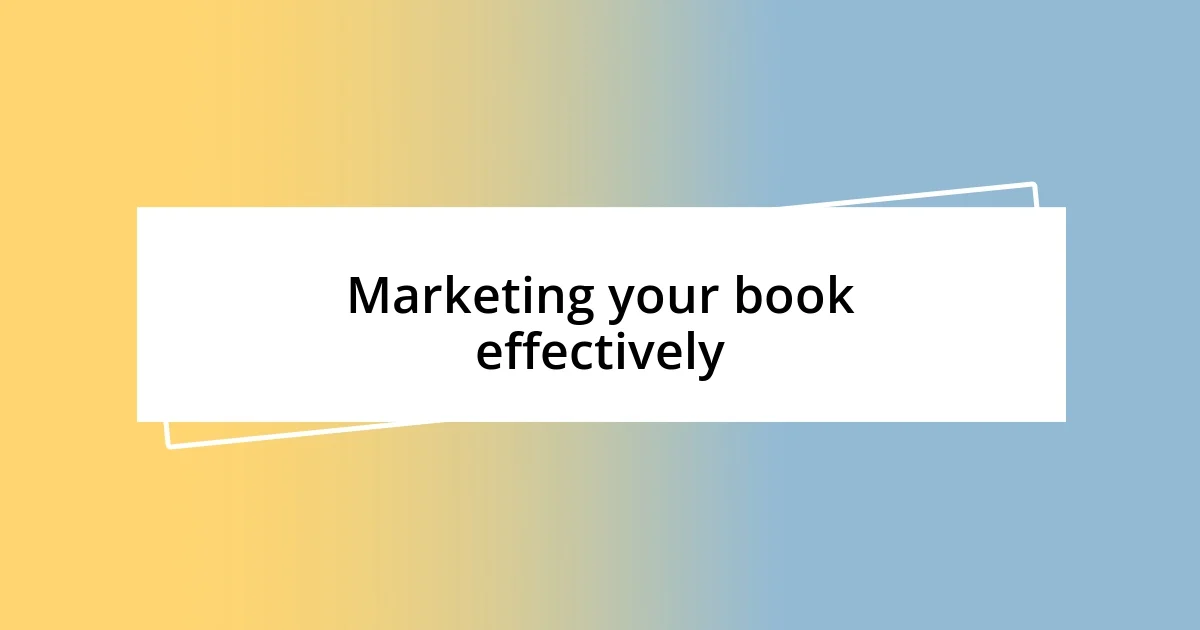
Marketing your book effectively
Marketing your book effectively can feel like a marathon rather than a sprint, and that realization hit me like a ton of bricks. I vividly recall my first foray into book promotion; I spent hours crafting the perfect press release, only to receive a deafening silence in response. It was a humbling moment that taught me invaluable lessons about targeting the right audience. Have you ever put your heart and soul into something, only to feel that it fell flat? I’ve definitely been there, and it made me realize that effective marketing hinges on understanding who will connect with your work.
I found that tapping into the power of personal stories transformed my marketing game. When I began to share my own experiences related to the themes of my book, readers became more engaged. For instance, discussing the emotional journey behind writing a particular chapter not only humanized my work but also fostered authentic connections. Have you considered what stories from your life could resonate with your audience? Sharing those bits of vulnerability can turn casual readers into passionate advocates.
Finally, leveraging different platforms and multimedia was a game changer for me. Creating short videos where I discussed my inspiration, or even hosting live Q&A sessions, made the marketing process feel dynamic and fun. It also opened up conversations that traditional methods simply couldn’t. I remember how nervous I was before my first live session—it felt like standing on a stage. But the genuine feedback I received afterward was worth every jitter. How can you break out of your comfort zone in promoting your work? Ultimately, staying engaged and creative in your approach allows your book to reach its potential audience more effectively.
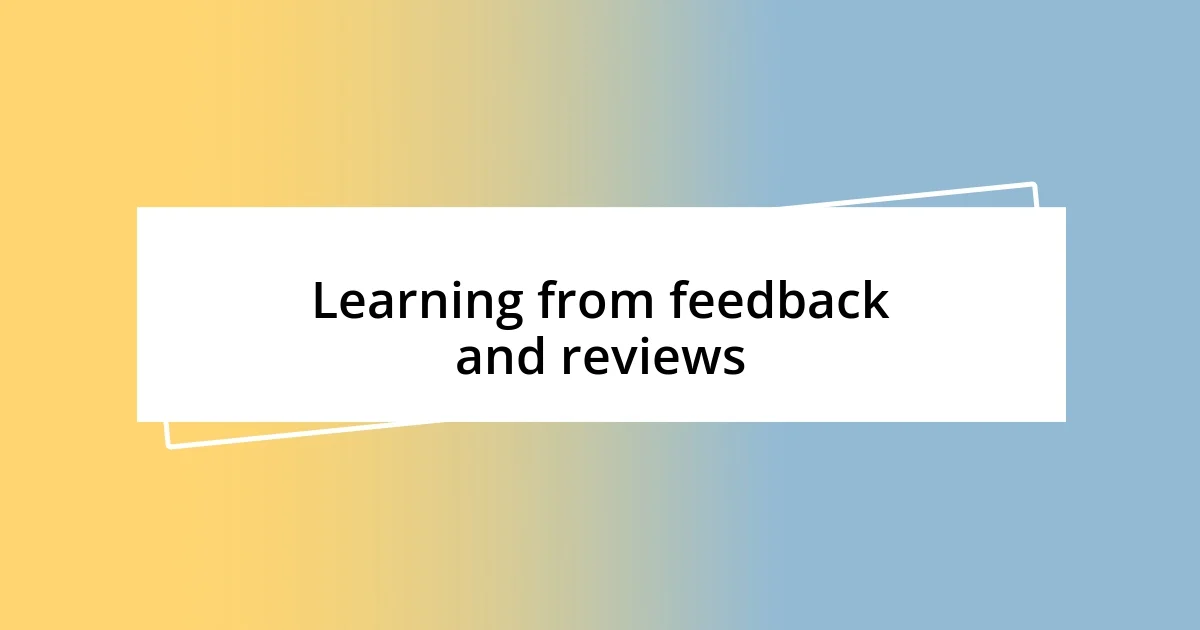
Learning from feedback and reviews
When it came to feedback and reviews, I was surprised by how much I could learn from them. After my book launched, I eagerly awaited the first reviews, a mix of excitement and anxiety swirling within me. One reader pointed out a plot hole I hadn’t noticed—it stung at first, but I realized that it was an opportunity for growth. Have you ever received critical feedback that made you rethink your work? It pushed me to reconsider how I approached storytelling in my subsequent projects.
I quickly discovered that not all feedback is created equal. Some reviews were exuberant, celebrating my style and character development, while others were more constructive. I found it essential to separate my emotional reactions from the actual substance of the reviews. The positivity fueled my motivation, while the critical ones became a valuable checklist for my next writing journey. I’ve learned that responding to reviews—be they good or bad—can provide insight into what resonates with readers. How do you approach feedback when it feels too personal?
There was one review that truly took me aback; a reader connected with a character’s struggle in a profound way, sharing their own experiences with mental health. The emotions I felt reading their words were indescribable—almost as if my work had created a lifeline. That connection reaffirmed my purpose as a writer. Why do we share our stories, if not to touch others’ lives? This experience not only inspired my writing but also instilled a sense of responsibility to approach sensitive topics with care and authenticity in the future.
